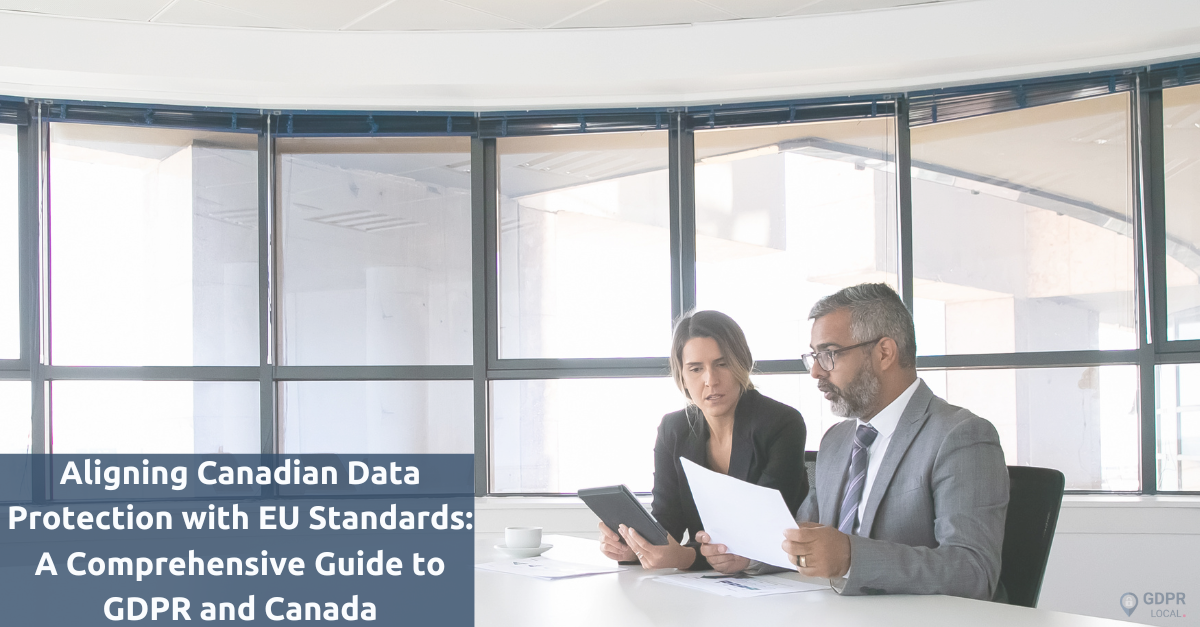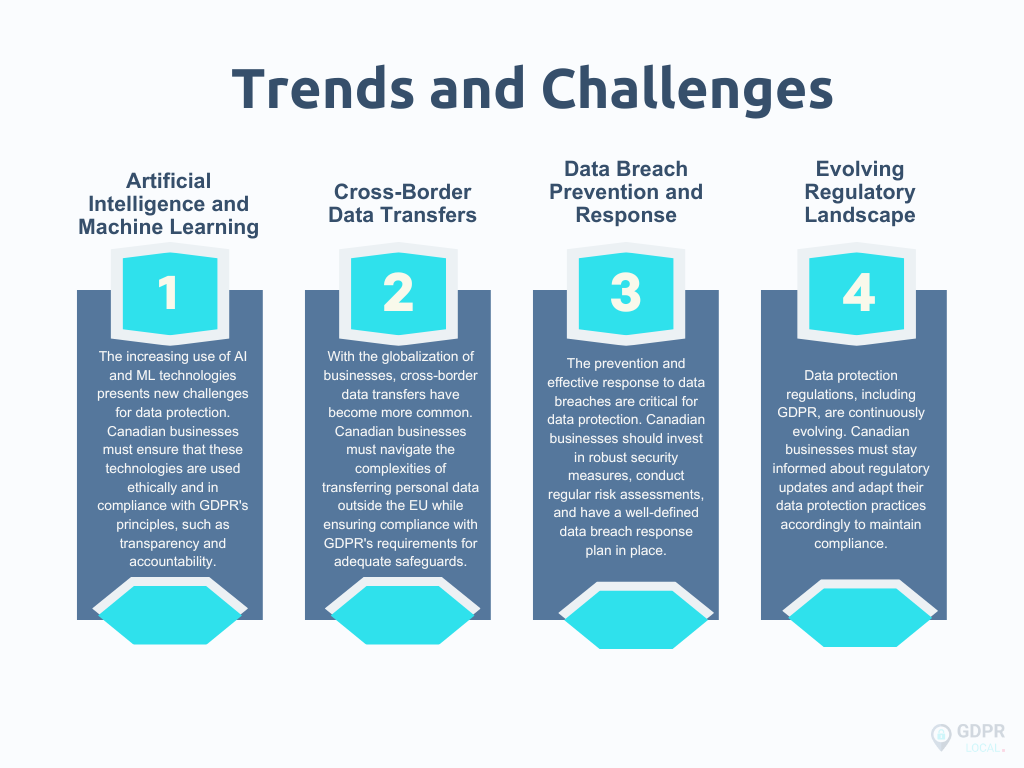
Aligning Canadian Data Protection with EU Standards: A Comprehensive Guide to GDPR and Canada
As personal data flows across borders with the click of a button, data protection has become a global concern. Two prominent players in this arena are the European Union’s General Data Protection Regulation (GDPR) and Canada’s data protection laws. In this guide, we’ll explore the similarities and differences between these two regulatory frameworks. Our discussion will examine how Canadian businesses can operate GDPR and Canadian data protection laws, as well as our role in supporting Canadian businesses.
Overview of GDPR and Canadian Data Protection Laws
GDPR: A Brief Overview
The General Data Protection Regulation (GDPR) was introduced by the European Union (EU) in 2018 to safeguard individuals’ privacy rights and harmonize data protection regulations across EU member states. GDPR sets strict standards for how personal data is collected, processed, and transferred, and imposes significant penalties for non-compliance.
Canadian Data Protection Laws: A Snapshot
Canada’s data protection landscape is primarily governed by the Personal Information Protection and Electronic Documents Act (PIPEDA). PIPEDA establishes rules for the private sector’s collection, use, and disclosure of personal information. While similar in many respects to GDPR, PIPEDA also reflects Canada’s unique legal and cultural context.
Comparing GDPR and Canadian Data Protection Laws
Scope and Applicability
Both GDPR and PIPEDA apply to a wide range of businesses and organizations. GDPR’s reach extends to any entity processing the personal data of EU residents, regardless of the entity’s location. PIPEDA, on the other hand, applies to organizations engaged in commercial activities within Canada.
Key Principles
Both frameworks emphasize core principles such as transparency, purpose limitation, data minimization, accuracy, and accountability. These principles guide how organizations collect, use, and handle personal data.
Individual Rights
Both GDPR and PIPEDA grant individuals certain rights over their personal data, including the right to access, correct, and delete their data. GDPR, however, introduces additional rights such as the right to data portability and the right to object to automated decision-making.
Consent and Lawful Basis
Both frameworks require organizations to obtain valid consent before processing personal data. GDPR’s definition of consent is more stringent, requiring explicit and unambiguous consent. PIPEDA’s consent requirements are more flexible, focusing on obtaining informed consent.
Data Transfers
GDPR places strict controls on transferring personal data outside the EU. Adequate safeguards, such as Standard Contractual Clauses (SCCs) or Binding Corporate Rules (BCRs), must be in place. PIPEDA also requires organizations to ensure similar safeguards when transferring data across borders.
Operating Dual Compliance
As businesses operate in Canada, they must navigate the intersection of GDPR and Canadian data protection laws. Aligning with both frameworks may involve adapting policies, procedures, and data handling practices. By understanding the shared principles and distinctive aspects of GDPR and PIPEDA, businesses can build a data protection strategy that respects individuals’ rights while meeting legal obligations.
Data breaches can have severe consequences for individuals, including identity theft, financial loss, and damage to personal and professional reputations.
By implementing strong data protection practices, businesses can demonstrate their commitment to safeguarding personal information and maintain compliance with applicable regulations.
Ensuring GDPR Compliance: Best Practices for Canadian Businesses
To ensure GDPR compliance, Canadian businesses should adopt best practices for data protection. These practices include:
| Conducting a Data Protection Impact Assessment (DPIA) | A DPIA is a systematic process for identifying and minimizing data protection risks. Canadian businesses should conduct DPIAs to assess the impact of their data processing activities on individuals’ privacy rights. This assessment helps identify potential risks and develop measures to mitigate them. |
| Implementing Strong Security Measures | Canadian businesses should implement robust security measures to protect personal data from unauthorized access, disclosure, alteration, or destruction. This includes using encryption, secure network protocols, access controls, and regular security audits. |
| Establishing a Data Breach Response Plan | Having a well-defined data breach response plan is crucial for Canadian businesses. This plan should outline the steps to be taken in the event of a data breach, including notifying affected individuals, authorities, and implementing measures to mitigate the impact of the breach. |
| Training Employees on Data Protection | Employees play a significant role in data protection. Canadian businesses should provide regular training to employees on data protection best practices, including the importance of safeguarding personal information, recognizing and reporting potential security incidents, and complying with GDPR and Canadian data protection laws. |
The Role of Data Protection Officers in GDPR Compliance
Under GDPR, some Canadian businesses may be required to appoint a Data Protection Officer (DPO). A DPO is responsible for overseeing the organization’s data protection strategy and ensuring compliance with GDPR requirements.
The role of a DPO includes:
– Providing advice and guidance on data protection matters
– Monitoring compliance with GDPR and Canadian data protection laws
– Serving as a point of contact for individuals and supervisory authorities
– Conducting internal data protection audits and assessments
– Cooperating with supervisory authorities and responding to their requests
A DPO should have expertise in data protection laws and practices and be independent in the performance of their duties. They should also have a good understanding of the organization’s data processing activities and be able to communicate effectively with stakeholders at all levels.
While not all Canadian businesses are required to appoint a DPO under GDPR, having a designated individual or team responsible for data protection can help ensure compliance and provide expert guidance on privacy and security matters.
Key Considerations for Canadian Businesses Handling EU Data
Canadian businesses that handle personal data of EU residents must carefully consider their obligations under GDPR. Key considerations include:
Determining the legal basis for processing personal data
Canadian businesses should ensure they have a lawful basis for processing personal data under GDPR. This may include obtaining explicit consent, fulfilling a contractual obligation, complying with legal requirements, or pursuing legitimate interests.
Implementing appropriate technical and organizational measures
Canadian businesses should implement measures to ensure the security and confidentiality of personal data, such as encryption, access controls, and regular data backups. These measures help protect personal data from unauthorized access, disclosure, or loss.
Ensuring data subject rights
GDPR grants individuals several rights regarding their personal data, including the right to access, rectify, erase, and restrict processing. Canadian businesses should have processes in place to respond to these requests and provide individuals with the means to exercise their rights.
Transferring personal data outside the EU
Canadian businesses that transfer personal data outside the EU must ensure that appropriate safeguards are in place. This may include using Standard Contractual Clauses (SCCs), Binding Corporate Rules (BCRs), or relying on the EU-US Privacy Shield framework.
By considering these key obligations, Canadian businesses can effectively handle personal data of EU residents while ensuring compliance with GDPR.
The Consequences of GDPR Noncompliance: Fines and Reputational Damage
Noncompliance with GDPR can have significant consequences for Canadian businesses. GDPR grants supervisory authorities the power to impose fines and sanctions on organizations that fail to comply with its requirements. The potential consequences of noncompliance include:
Fines: GDPR allows for administrative fines of up to 4% of the organization’s global annual turnover or €20 million, whichever is higher. The exact amount of the fine depends on the nature, gravity, and duration of the infringement.
Reputational Damage: Noncompliance with GDPR can result in reputational damage for Canadian businesses. News of data breaches or privacy violations can erode customer trust and loyalty, leading to a loss of business and negative publicity.
Legal Liabilities: Noncompliance with GDPR can also result in legal liabilities, including civil claims for damages by affected individuals. Canadian businesses may face lawsuits and legal proceedings if they fail to protect personal data or violate individuals’ rights under GDPR.
To mitigate the risk of noncompliance, Canadian businesses should prioritize data protection and GDPR compliance, implementing robust security measures, conducting regular audits, and staying informed about evolving regulatory requirements.
The Future of Data Protection: Emerging Trends and Challenges
The field of data protection is constantly evolving, driven by technological advancements and changing regulatory landscapes. As Canadian businesses strive to align their data protection practices with GDPR standards, they must also stay ahead of emerging trends and challenges in the field. Some key trends and challenges include:

By staying informed about emerging trends and challenges, Canadian businesses can proactively address data protection issues and ensure ongoing compliance with GDPR and other relevant regulations.
Conclusion: Building a Comprehensive Data Protection Strategy
Aligning Canadian data protection practices with EU standards, as outlined in GDPR, is essential for maintaining customer trust, complying with regulatory requirements, and mitigating legal and reputational risks.
As data protection regulations continue to evolve and new challenges emerge, Canadian businesses must remain proactive in adapting their data protection strategies and staying informed about regulatory updates.
With our expertise and comprehensive services, we can help Canadian businesses establish secure data protection practices and build a culture of privacy and security. Contact us today at [email protected].
Resources for Further Guidance on GDPR and Canadian Data Protection Laws
For additional guidance on GDPR and Canadian data protection laws, check out these resources:
GDPRLocal https://gdprlocal.com/ | GDPRLocal offers comprehensive guidance and services for GDPR compliance, including data protection assessments, privacy policy development, and training programs. |
Office of the Privacy Commissioner of Canada https://www.priv.gc.ca/en/ | The Office of the Privacy Commissioner of Canada provides information and resources on Canadian data protection laws, including PIPEDA, and offers guidance for businesses and individuals. |
| European Data Protection Board https://edpb.europa.eu/ | The European Data Protection Board provides guidance and interpretations of GDPR requirements, offering valuable insights for Canadian businesses handling EU data. |
| Canadian Centre for Cyber Security https://www.cyber.gc.ca/en/ | The Canadian Centre for Cyber Security offers resources and guidance on cybersecurity best practices, including data protection measures, for Canadian businesses. |
| International Association of Privacy Professionals (IAPP) https://iapp.org/ | The IAPP is a global community of privacy professionals that provides training, certification programs, and resources on data protection and GDPR compliance. |